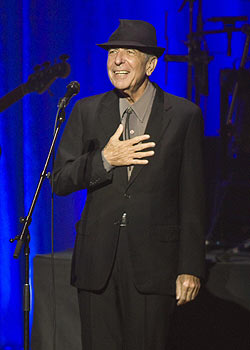A Fortnight In The Tower Of Song: Leonard Cohen And The Creative Life
Published on January 30th, 2010 in: Canadian Content, Concert Reviews, Music |The Janus face of American Idol‘s flat, physical, self-involvement charge Cohen’s earliest albums. It’s at best a robustness, a nervy completeness in practice that undergirds whatever concepts, signs, and sacraments the Jewish-cum-Buddist puts in play. The first four albums bristle with this authority that is Cohen’s voice, a lens of unremitting and unrepentant ego that focuses his best work. In the recent documentary I’m Your Man, Cohen goes so far to censure the narrator of “The Traitor” for not approaching his desire for a friend’s lover, unfettered with shame or pangs of guilt. Daring, perverse, often self-incriminatory in their romantic flights, Songs of Leonard Cohen, Songs from a Room, and Songs of Love and Hate are breathtaking in their reach and touch.

Photo © 2009 by John Petric
Cohen was once willing to welcome artistic failure to the table—not as a creative eventuality, but as a medium of the moving mind and body. How else to explain the fascinating-in-its-own-right Spector collaboration of Death of a Ladies’ Man, or the occasional bout of manic misanthropy à la his contemporary John Cale as heard in “Diamonds in the Mine”? That overreach isn’t unnatural or uneasy to an artist who lusts after friends’ wives with no compunction (“Suzanne”); turns biblical narratives into violent protests that resist topicality (the “Story of Isaac” and its haunting threat that, when it all comes down to dust/I will help you if I must/I will kill you if I can); possesses and consumes women with a twinge of dispassion but no disregard (“Joan of Arc,” “Chelsea Hotel #2”); and conflates and construes the artist’s life as militarized regimentation and righteous struggle (“The Partisan,” “Field Commander Cohen,” “There is a War”).
Some detractors claim that early Cohen’s Dylanesque speak-singing and nasal tenor tend to value poetry over the song proper, as if this were a weakness. His delivery is perhaps the abiding and fundamental strength in all of his best work. There is an otherness and a freedom in his phrasing and arrangement that occasionally suggests a compositional naiveté, exemplified by the tenebrous accompaniment on the debut’s “Stories of the Street” as it hits the rising major-key change in the chorus.
But more often the sinuous and inscrutable progressions of, say, one of my favorite darker Songs of Love and Hate, “Avalanche”—along with the similarly modeled “Love Calls You By Your Name,” “Dress Rehearsal Rag,” “Who By Fire,” and “Story of Isaac,” to name a few—arrest attention. Winding word and form, chord and chorus in unconventional, clumsy, thrilling ways, many of his sparse “gypsy” style compositions push against the grain of expectation and encourage careful listening. Cohen also exhibited an early acumen for traditional vocal harmony arrangement: when to go for broke (as in the irresistible refrain of “So Long, Marianne”), and when to accent for effect (in underlying the second coming in the devastating lament of “Last Year’s Man”).
What most of the songs above have in common, outside of prepossessing me for weeks on end, is that they did not find their way onto the night’s setlist at Columbus’ suitably ornate Palace Theatre. Cohen favored material from Various Positions through Dear Heather, albums featuring increasingly more conventional and staid forays into genre writing, from adult contemporary to rote balladry. Songs that did not allow for full, largely uneventful 11-piece arrangements did not receive consideration, aside from a moving duet of “If It Be Your Will,” Cohen and Casio on “Tower of Song,” and a needless Sharon Robinson stroll down “Boogie Street.”
No surprise that Cohen and company delivered rousing performances of “Suzanne” and “Famous Blue Raincoat,” and hit the punchlines of “Chelsea Hotel #2” with appreciation; more surprising that the strongest of his synth-based songcraft, beginning with “Dance Me to the End of Love” through “I’m Your Man,” benefited from the full accompaniment in spades; and somewhat shocking that almost each and every song was stretched to bear several lengthy and dispersive solos from his crack band. Sympathetic players, perhaps—attentive and reverent in the least—and a sympathetic frontman.
Time limit is exhausted. Please reload the CAPTCHA.